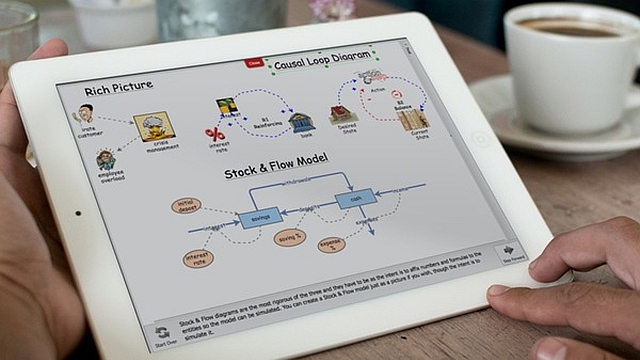
Taking responsibility for complexity (section 3.3.1): Decisions from deliberation
This article is part of section 3.3 of a series of articles featuring the ODI Working Paper Taking responsibility for complexity: How implementation can achieve results in the face of complex problems.
In the face of complexity, ‘deliberation’ should be a central process guiding decision-making, by mobilising and combining various perspectives and drawing on many types of knowledge. This involves carefully designed processes where different types of evidence are combined and weighed up in a reasoned fashion, through an inclusive and transparent dialogue 1. The aim is to make decisions that are relevant, feasible and implementable by combining different perspectives and building consensus prior to a decision2. Key stakeholders should be brought together to discuss and consider appropriate action and policy responses, sharing knowledge, considering different perspectives on an issue and reaching reasoned, consensual decisions where possible. Another characterisation of this kind of process is ‘collaborative learning’ 3, or a process of ‘collective inquiry’ – a kind of collaborative action research working towards a shared ideal and collective governance and decision-making4.
A wide range of areas of practical experience and theoretical reflection shows deliberative process can have a number of beneficial effects on decision-making and implementation. Work on social learning gives a substantive rationale for inclusive deliberation, arguing that collective discussion and incorporating a multiplicity of points of view improve the quality of decisions, policies and assessments produced. Multi-stakeholder deliberation prior to action has proven to build commitment and enhance the ability of units to adapt in the face of unpredictable problems. For example, in India, deliberative processes, incorporating multiple perspectives and building cohesion and experience, were the main factors explaining the differential response of community adaptation to climatic variability, being the most operative explanation for residents requiring less recourse to debt and maintaining feed stocks and production, even in drought conditions5. Moreover, a central challenge of evidence-based policy in health is not to develop the evidence needed for policy, but rather to develop more systematic, rigorous and transparent methods for identifying, interpreting and applying evidence in different decision-making contexts6. On a more practical note, Cash et al.7 argue that these processes can increase credibility, by bringing multiple types of expertise to the table; salience, by engaging end users in defining data needs; and legitimacy, by providing multiple stakeholders with more transparent access to the information production process8. Box 9 shows two contrasting examples of deliberative processes.
Box 9: Contrasting deliberative processes
One example of a deliberative process integrated at a high level into policy-making can be seen at the National Institute for Clinical Excellence (NICE) in the UK. In order to evaluate new health care technologies, NICE invites formal submissions from interested parties and holds consultations and invited commentaries from consultees and commentators (with a careful demarcation between the two); systematic reviews; technical modelling exercises; and multi-party representation in the large deliberative committee, which hears witnesses. There are also appeal possibilities and various support groups, some using consensus methods on controversial issues and others advising who to consult9.
At the other end of the scale, ‘adaptive collaborative management’ (ACM) has proven a highly effective method for forest user groups to manage their resources. It involves bringing together a range of community stakeholders, technical experts and implementing agencies to engage in proactive processes of reflection and adaptation. The centrepiece is collective learning processes between actors, which involves managed processes of reviewing and interpreting the available indicators and knowledge and feeding this into activity plans10.
There are some practical considerations in implementing deliberative approaches. Generally, they require face-to-face meetings, typically combinations of workshops, consultations and roundtables (etc.), at which actors convene to discuss and debate pressing issues. They require detailed and in-depth discussion and carefully structured and managed processes, allowing groups of people to engage in reflection, interaction and learning. As such, general informal policy discourse, often mediated by elites or the media, does not count as a deliberative approach. This means it is not easy to ‘scale up’ deliberation. However, as we have seen, learning and action must take place at a variety of scales (rather than just en masse at one level) and be embedded at related and possibly nested levels of governance; these processes, with appropriate representation throughout, could allow scale-up of deliberation to be carried out.
Deliberative processes must be action-oriented rather than functioning as just a ‘talking shop.’ They need to be aimed at an explicit decision, or at a decision context on which they will have a direct bearing11, so as to address specific problems in a clear-cut and managed way rather than simply being a source for generating ongoing perspectives on an issue12. As such, while deliberation specifically requires a departure from straightforward majority rule, it is important to embed within it mechanisms to combat the danger of discussions stalling and failing to reach a consensus, and also the conservatism that can sometimes be inherent in consensus approaches.
Participants should also have a role in ‘doing’ as well as discussing, to ensure that new possibilities are explored and reflected on immediately. Literature on social learning shows that participants should be involved in carrying out policies or actions, for example actively testing models or hypotheses in the field13. For example, the literature on agricultural innovation shows that agricultural reforms often should be carried out not in a top-down, ‘transfer of technology’ approach, but rather using the ‘field as a laboratory,’ developing and testing new methods and technologies with practitioners as well as working in controlled conditions. This allows for the combination of scientific knowledge with tacit knowledge of local circumstances and indigenous technical knowledge, and centres on embedding two-way, interactive and deliberative processes. It can make reforms more relevant and more likely to be adopted and have an impact on poverty reduction14.
Next part (section 3.3.2): Focusing on how change happens.
See also these related series:
- Exploring the science of complexity
- Planning and strategy development in the face of complexity
- Managing in the face of complexity.
Article source: Jones, H. (2011). Taking responsibility for complexity: How implementation can achieve results in the face of complex problems. Overseas Development Institute (ODI) Working Paper 330. London: ODI. (https://www.odi.org/sites/odi.org.uk/files/odi-assets/publications-opinion-files/6485.pdf). Republished under CC BY-NC-ND 4.0 in accordance with the Terms and conditions of the ODI website.
References and notes:
- Lomas, J., Culyer, T., McCutcheon, C., McAuley, L. and Law, S. (2005). ‘Conceptualising and Combining Evidence for Health System Guidance.’ Ottawa: Canadian Health Services Research Foundation. ↩
- Culyer, A. J. and Lomas, J. (2006). ‘Deliberative Processes and Evidence-informed Decision-making in Healthcare: Do They Work and How Might We Know?’ Evidence and Policy 2(3): 357-371. ↩
- Daniels, S. and Walker, G. (1996). ‘Collaborative learning: Improving public deliberation in ecosystem-based management’, Environmental Impact Assessment Review, 16(2): 71–102. ↩
- Brown, V. (2007) ‘Collective Decision-making Bridging Public Health, Sustainability Governance, and Environmental Management.’ in Soskolne, C. (ed.) Sustaining Life on Earth: environmental and Human Health through Global Governance. Lanham, MD: Lexington Books. ↩
- Bhadwal, S. (2008). Understanding adaptive policy mechanisms through participatory irrigation management in Maharashtra, India. India: The Energy and Resources Institute. ↩
- Dobrow, M., Goel, V., Lemieux-Charles, L. and Black, N. (2006). ‘The Impact of Context on Evidence Utilization: A Framework for Expert Groups Developing Health Policy Recommendations.’ Social Science & Medicine 63(7): 1811-1824. ↩
- Cash, D., Clark, W., Alcock, F., Dickson, N., Eckley, N., Guston, D., Jager, J. and Mitchell, R. (2003). ‘Knowledge Systems for Sustainable Development’, The Proceedings of the National Academy of Sciences 100(14): 8086–91. ↩
- It should be noted that, although there are similarities between deliberative processes and participatory approaches, and although in many situations an approach could be described as both participatory and deliberative, the two diverge in important ways. Participatory processes are focused largely on engaging the poor in ‘bottom-up’ processes of decision-making and policy formation, and are often aimed at helping to orient programmes towards pro-poor priorities, in order to make development processes more representative, giving citizens the power to determine the course of their own development. Thus, they have different starting points and different practical implications (more on this to follow). The importance of ideas of representation and of normative perspectives on participation will be revisited in a new light in the next section. ↩
- Culyer, A. J. and Lomas, J. (2006). ‘Deliberative Processes and Evidence-informed Decision-making in Healthcare: Do They Work and How Might We Know?’ Evidence and Policy 2(3): 357-371. ↩
- McDougal, C., Pandit, B., Danjade, M., Paudel, K., Ojha, H., Maharjan, M., Rana, S., Bhattarai, T. and Dangol, S. (2009). ‘Facilitating Forests of Learning: Enabling an Adaptive Collaborative Approach in Community Forest User Groups.’ Jakarta: CIFOR. ↩
- Cash, D., Clark, W., Alcock, F., Dickson, N., Eckley, N., Guston, D., Jager, J. and Mitchell, R. (2003). ‘Knowledge Systems for Sustainable Development’, The Proceedings of the National Academy of Sciences 100(14): 8086–91. ↩
- Michaels, S. (2009). ‘Matching Knowledge Brokering Strategies to Environmental Policy Problems and Settings.’ Environmental Science and Policy 12(7): 994-1011. ↩
- Jones, N., Jones, H. and Walsh, C. (2008) ‘Political Science? Strengthening Science–Policy Dialogue in Developing Countries.’ Working Paper 294. London: ODI. ↩
- Lundvall, B.-A., Johnson, B. and Dalum, B. (2002). ‘National Systems of Production, Innovation and Competence-building.’ Research Policy (31): 265-272. ↩





